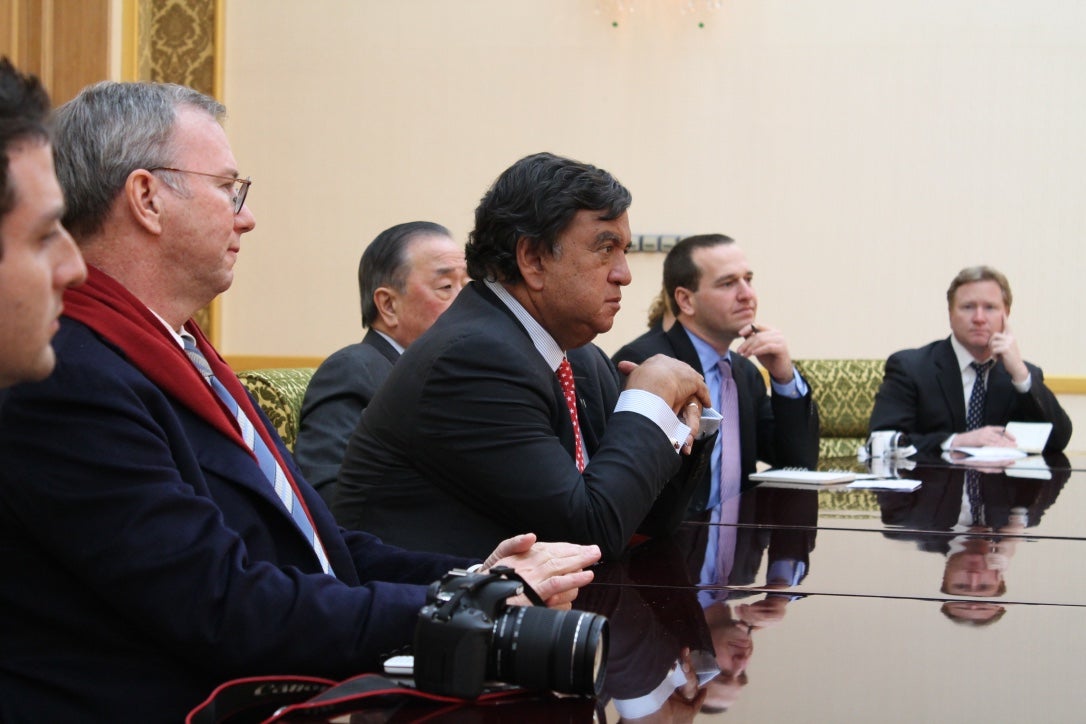
Vice President and Executive Director of The Richardson Center for Global Engagement Mickey Bergman (MSFS ’05) is reflective when talking about his career. Bergman has worked for more than a decade in what he describes as “fringe diplomacy”, forging channels of engagement between nations and organizations not usually open to more traditional diplomatic efforts. Through The Richardson Center, Bergman manages relationships in North Korea, Cuba, Myanmar, and across the Middle East and Africa.
As reported in The Washington Post, Bergman—alongside The Richardson Center’s founder and former New Mexico Governor Bill Richardson—is nominated for the 2019 Nobel Peace Prize. The Nobel committee will consider a number of The Richardson’s Center’s successful negotiations as part of their deliberations, including its work to secure the release of late American college student Otto Warmbier from North Korea and its efforts to repatriate the remains of numerous U.S. servicemen who died in battle or captivity in the country.

The negotiations garnered attention around the world but Bergman maintains that the achievements are more complex than the headlines they generated. “To me, ‘career highlights’ are not a synonym to ‘success stories’,” he says. “Life is complicated and in every story and case we have mixed results, failures, and successes. Yes, we were able to bring Otto Warmbier back to his family, but he was in a coma. [Warmbier died days after his release.] Yes, we’ve been able to train and help Myanmar in its transition to democracy, but we have failed to move Aung San Suu Kyi on the Rohingya genocide.” For Bergman, it is “human interactions” that make his work so rewarding: “My highlights are when a family of a political prisoner or hostage feels that they are no longer abandoned by their government…or when I spent my 40th birthday in Havana enabling the first-ever incubator of American and Cuban entrepreneurs.”
These person-to-person connections drive the work of The Richardson Center. Bergman believes that The Center’s focus on establishing trust and understanding between parties through genuine connection is what makes the organization so successful. “Without a doubt, the most important element of our work is the personal relationships we build. It is not about maximizing the number of business cards you collect, your Facebook friends, or your Linkedin connections. It is about meaningful engagement. It is about truly understanding the individuals you are working with and understanding how they see the world.”

The value Bergman places on meaningful personal relationships is what first drew him to the MSFS program. “I chose MSFS because of the students. It was the best investment of my professional life,” he says. He still remembers the exact moment during an event for admitted students when he knew he wanted to come to MSFS: “Everyone was asked to quickly introduce themselves and talk about what they’d done in the last couple of years. When hearing these stories, I felt overwhelmingly under-qualified and wondered who accidentally admitted me to the program!” Thirteen years since graduating, Bergman has worked directly with more than twenty former classmates and still calls on numerous others for advice on subjects that are important to The Richardson Center’s work.
For Bergman, working on your “emotional intelligence”—your ability to connect meaningfully with others who do not necessarily share your values—is critical for anyone who wants to pursue a career in diplomacy. “As students and practitioners of international relations, we study and focus almost exclusively on ‘national interests’. Yes, national interests are important, but we are missing the human relations portion, which is the make or break of war and peace. So many miscalculations, crises, and wars were not prevented because we view everything only through the lens of national interests. Learning to manage our own emotions and relations with others is a key skill in which we have a major deficit.”
In addition to his work at The Richardson Center, Bergman dedicates his time to training a new generation of diplomats and global leaders at MSFS. As a practitioner faculty member at the program, he emphasizes the importance of emotional intelligence in diplomatic work and plans to teach a course on applying the skill to international affairs next semester. He believes that a key element to building strong interpersonal connections is to identify the principles that matter to an individual, including oneself. According to Bergman, one of the most valuable things his students can do is to use their time at MSFS to determine their moral values. “If you don’t spend the time at MSFS finding your own moral compass, you might find yourself effecting policies that do not align with what you want to be bringing to this world. Invest the time now to know who you are and what you stand for.”